
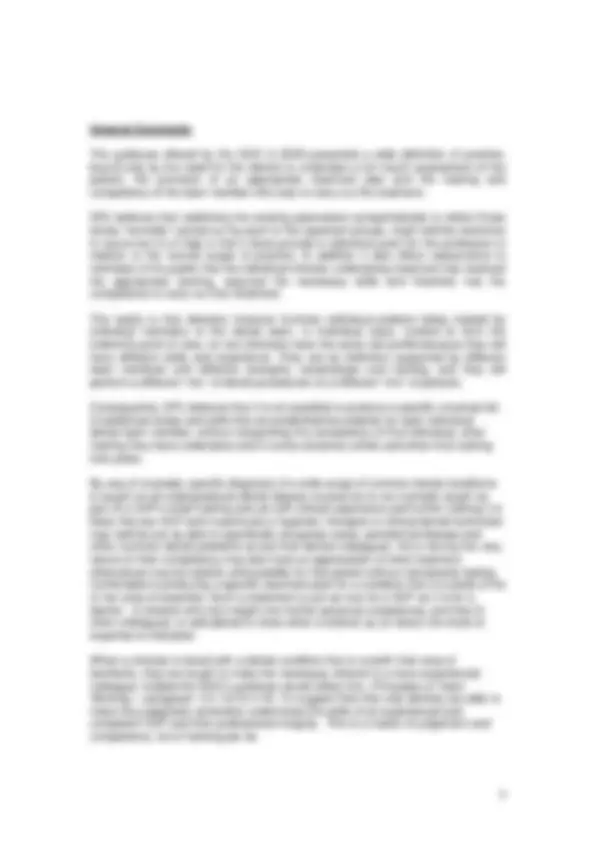
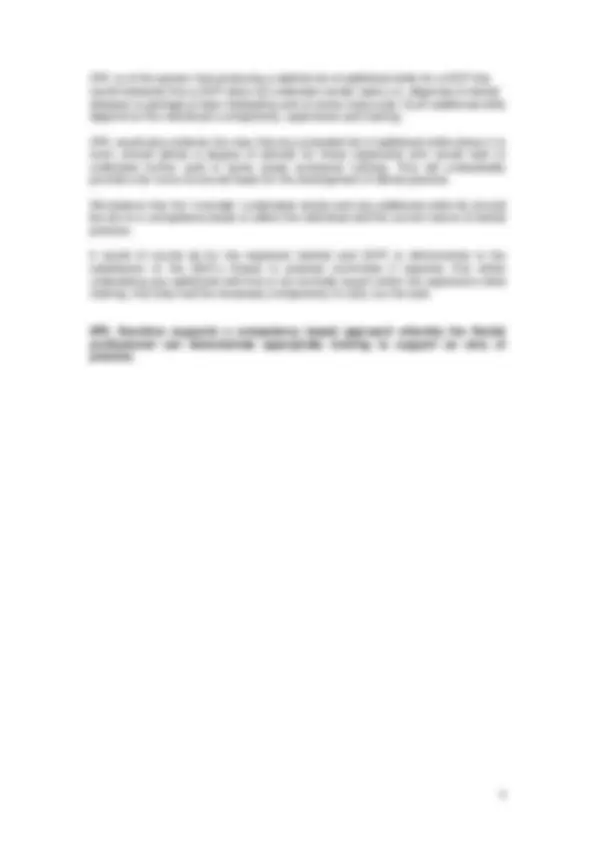
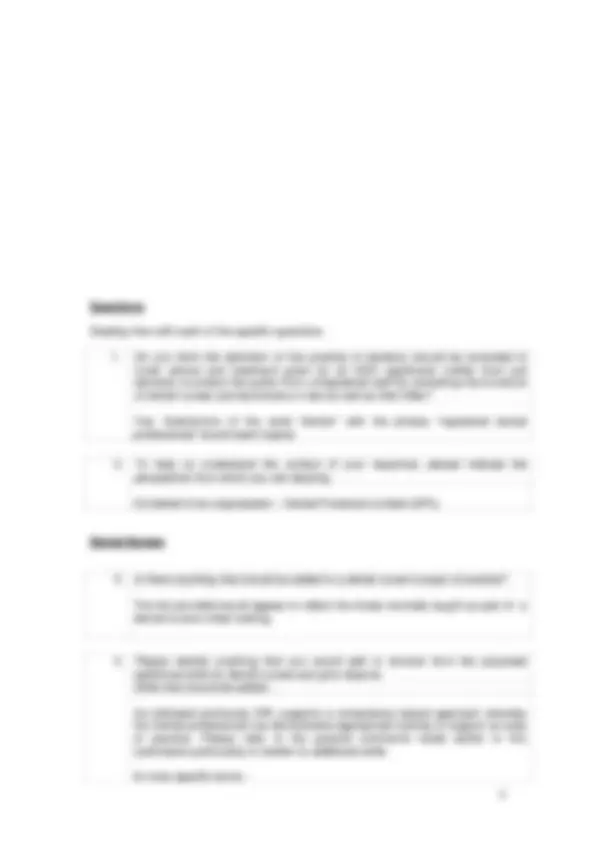
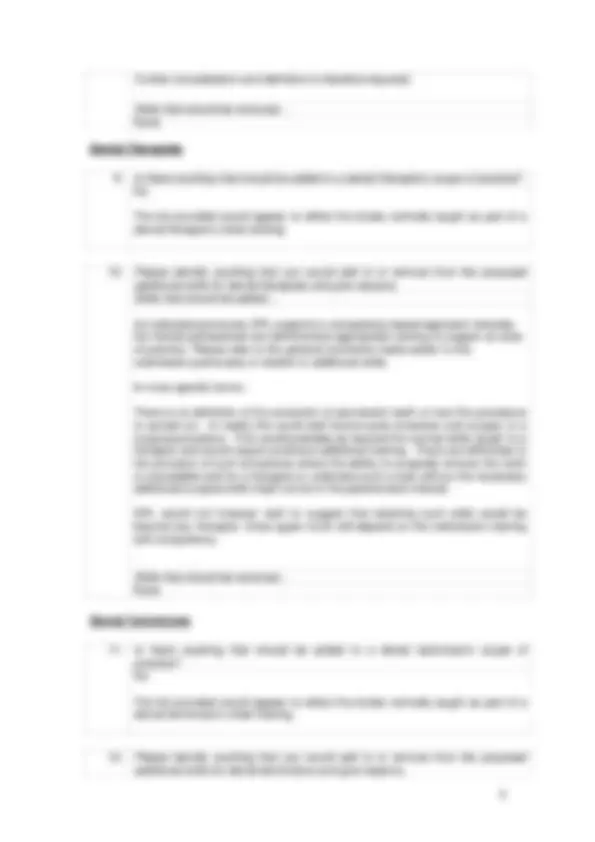
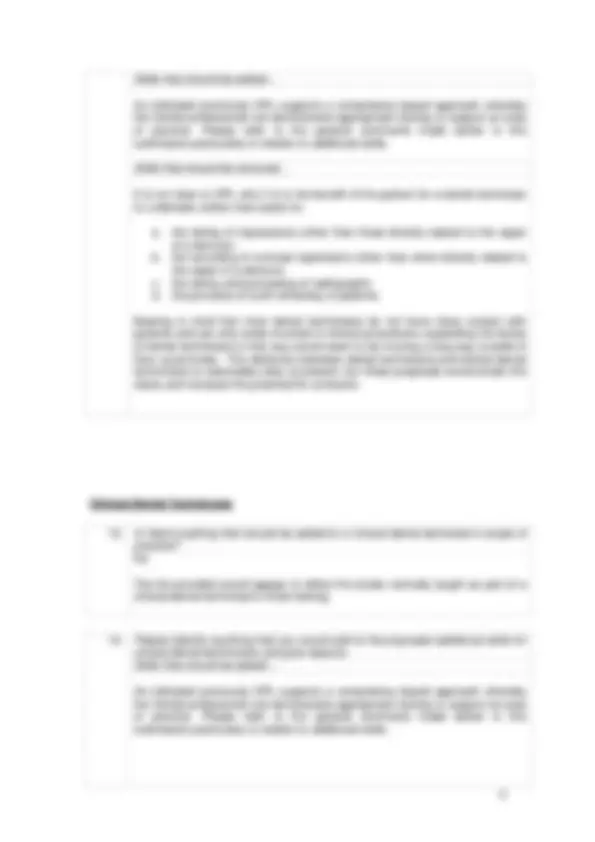
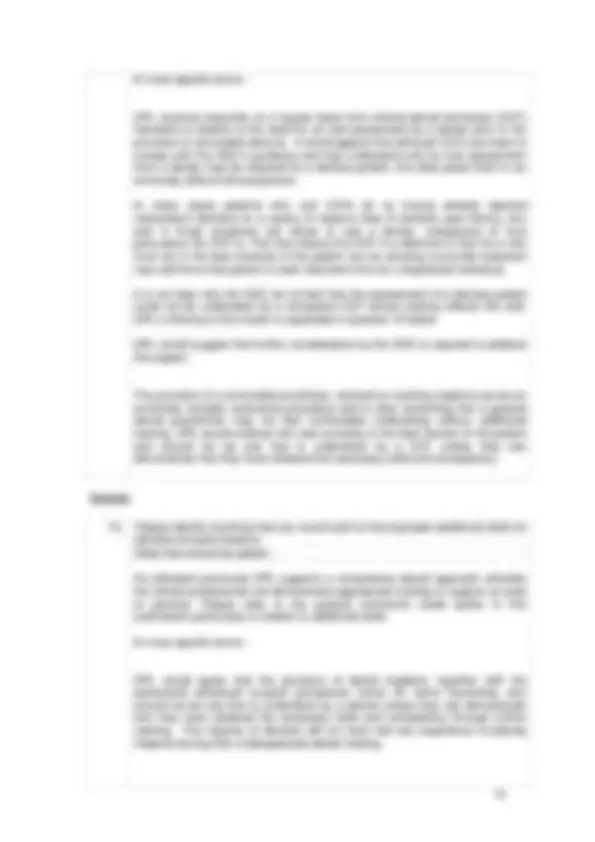
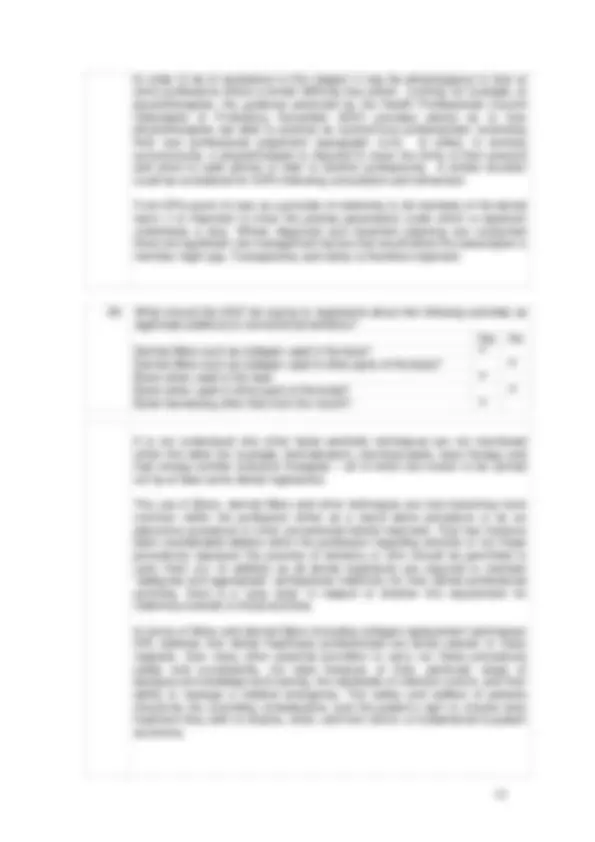
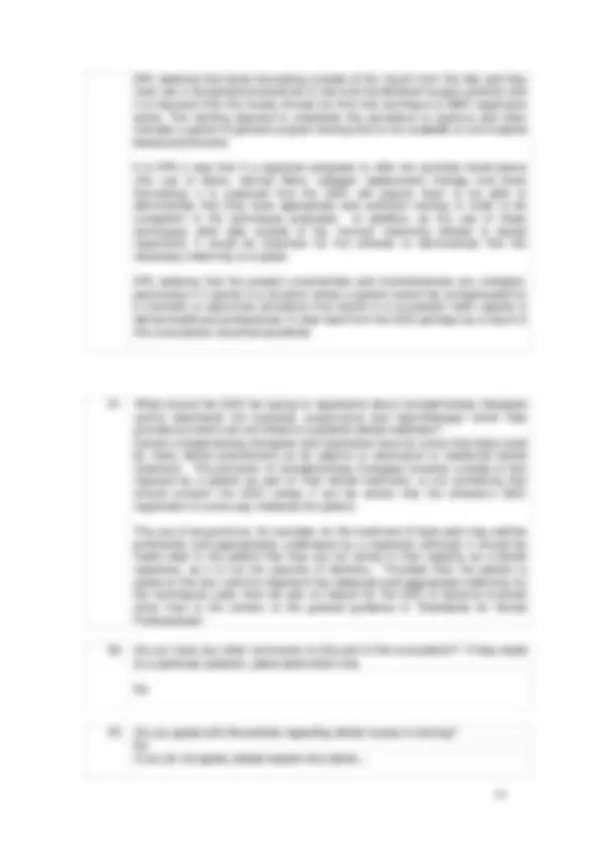
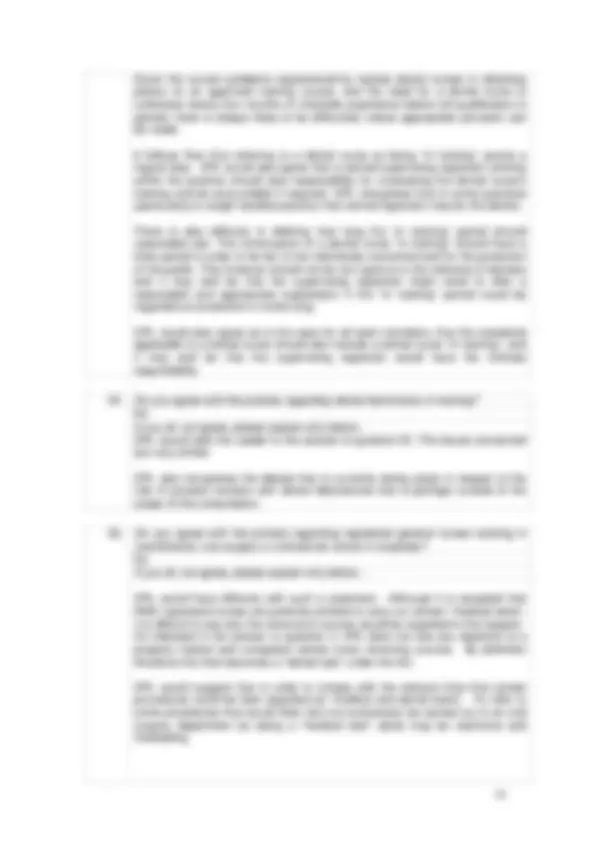



Study with the several resources on Docsity

Earn points by helping other students or get them with a premium plan


Prepare for your exams
Study with the several resources on Docsity

Earn points to download
Earn points by helping other students or get them with a premium plan
Community
Ask the community for help and clear up your study doubts
Discover the best universities in your country according to Docsity users
Free resources
Download our free guides on studying techniques, anxiety management strategies, and thesis advice from Docsity tutors
The challenges of setting fair indemnity subscriptions for dental team members and supports a competency-based approach. Dental Protection Limited (DPL) provides professional indemnity to dental nurses and has extended membership to other dental care professionals (DCPs). the variety of dental procedures performed by individual team members and their different levels of training. DPL believes that producing a specific list of additional skills for DCPs is not feasible without considering the competency and training of the individual. The document also explores questions about amending the definition of dentistry practice, adding to the scope of practice for dental nurses, hygienists, therapists, and technicians, and the use of Botox and dermal fillers by dental healthcare professionals.
What you will learn
Typology: Exams
1 / 18

This page cannot be seen from the preview
Don't miss anything!











Introduction
Dental Protection Limited (DPL) is a wholly-owned subsidiary company of the Medical Protection Society (MPS) which is the world’s largest professional indemnity organisation for doctors, dentists and other healthcare workers, having over 250, members internationally. The two companies operate on a mutual, not for profit, discretionary basis as they have done successfully since 1892.
DPL serves over 51,000 dental members in 70 countries worldwide. This total includes approximately 70% of UK dentists and a higher proportion of UK dental therapists and hygienists. DPL also indemnifies the overwhelming majority of dental care professionals (DCPs) in Australia and New Zealand. Where many of the issues discussed here have been a reality for many years. DPL is therefore uniquely placed to provided comment on the consultation document.
DPL currently offers professional indemnity to dental nurses working in general and specialist dental practice under its existing subscription arrangements, provided their employer is a full member of DPL and is paying the appropriate subscription. In April 2007 DPL extended its membership to all DCPs with a wide and varied subscription options to suit the requirements of each individual DCP, including those who take the opportunity to own and operate dental practices or dental laboratories.
DPL welcomes the opportunity to comment on the General Dental Council’s (GDC’s) consultation on the scope of practice. The Council will be aware that DPL is a strong advocate of the concept of an integrated dental team and continues to support the expansion and registration of that team.
DPL recognises the importance of the GDC’s documents in establishing the principles and values expected of the profession as a whole. In addition DPL agrees that only appropriately trained, qualified and registered members of the dental team should be permitted to practise dentistry. DPL similarly recognises that each registrant has a responsibility to ensure that dentistry is practised within the limits of the registrant’s training, expertise and competence and that it would not be appropriate to undertake procedures for which the registrant is neither qualified nor trained.
DPL believes that team working in dentistry requires that the right mix of skills and people interact. The key issue is striking the right balance between team members who already posses the necessary skill levels and those who have the potential to train and develop.
The activities of each individual member of the team regularly impacts on the way that problems arise and more importantly from DPL’s point of view, on the way that they are resolved. As such DPL has a special interest in the outcome of this consultation. Not only would it wish to see the individual members of the team extend and expand their skills but it must also look to providing effective indemnity to its members. Not knowing the range and scope of practice duties normally undertaken by each individual dental team member makes meaningful and fair indemnity subscription setting extremely difficult.
DPL is of the opinion that producing a definite list of additional skills for a DCP that would indicates that a DCP does not undertake certain tasks (i.e. diagnose of dental disease) is perhaps at best misleading and at worse inaccurate. Such additional skills depend on the individual’s competency, experience and training.
DPL would also endorse the view that any extended list of additional skills where it to exist, should allows a degree of latitude for those registrants who would wish to undertake further (and in some cases extensive) training. This will undoubtedly provide a far more structured basis for the development of dental practice.
We believe that the “normally” undertaken duties and any additional skills list should be set on a competency basis to reflect the individual and the current nature of dental practice.
It would of course be for the registrant (dentist and DCP) to demonstrate to the satisfaction of the GDC’s fitness to practise committee if required, that whilst undertaking any additional skill that is not normally taught within the registrants initial training, that they had the necessary competency to carry out the task.
DPL therefore supports a competency based approach whereby the Dental professional can demonstrate appropriate training to support an area of practice.
Questions
Dealing then with each of the specific questions:
Do you think the definition of the practice of dentistry should be amended to cover advice and treatment given by all GDC registrants (rather than just dentists) to protect the public from unregistered staff by protecting the functions of dental nurses and technicians in law as well as their titles?
Yes. Substitution of the word “dentist” with the phrase “registered dental professional” would seem logical.
To help us understand the context of your response, please indicate the perspective from which you are replying.
On behalf of an organisation – Dental Protection Limited (DPL)
Dental Nurses
The list provided would appear to reflect the duties normally taught as part of a dental nurse’s initial training.
Please identify anything that you would add or remove from the proposed additional skills for dental nurses and give reasons. Skills that should be added…
As indicated previously DPL supports a competency based approach whereby the Dental professional can demonstrate appropriate training to support an area of practice. Please refer to the general comments made earlier in this submission particularly in relation to additional skills.
In more specific terms:-
DPL does not understand why the GDC felt that orthodontic therapists should not be able to undertake certain fundamental tasks as their exclusion would not seem to be in the best interest of the patient.
The use of local analgesia for example is not defined, but it is assumed that this relates to the use of local anaesthetic injections by infiltration. This seems an unnecessary exclusion. The removal of brackets and bands in orthodontic treatment can for some patients be uncomfortable and may necessitate the use of local anaesthetic. There would appear to be little reason why a suitably trained orthodontic therapist should not be entirely competent in its use.
In addition the placement of temporary dressings in an emergency would seem to be logical duty for any competent registrant. It is possible for example that when a band is removed from around a restored tooth that the restoration itself could becomes dislodged. If the dentist or another suitably trained DCP is not available to place a temporary dressing, the best interests of the patient are unlikely to be served by prohibiting the orthodontic therapist from providing first aid relief such as this.
Skills that should be removed…
None
Dental Hygienists
Is there anything that should be added to a dental hygienist’s scope of practice?
The list provided would appear to reflect the duties normally taught as part of a dental hygienist’s initial training.
Please identify anything that you would add to or remove from the proposed additional skills for dental hygienists and give reasons. Skills that should be added…
As indicated previously DPL supports a competency based approach whereby the Dental professional can demonstrate appropriate training to support an area of practice. Please refer to the general comments made earlier in this submission particularly in relation to additional skills.
In more specific terms:-
It is suggested that hygienists may carry out “periodontal surgery” this term is not defined. Periodontal surgery can cover a wide range of surgical procedures, some of which are relatively simple whilst other (i.e., reverse bevel gingivectomies, free gingival grafts etc) require considerable surgical skill within the mouth that are perhaps a long way outside the current initial training provided to hygienists.
It may be realistic for an individual hygienist who possesses these skills to carry out such procedures but it would be necessary for that hygienist to be able to demonstrate their competence if challenged.
Further consideration and definition is therefore required.
Skills that should be removed… None
Dental Therapists
The list provided would appear to reflect the duties normally taught as part of a dental therapist’s initial training.
Please identify anything that you would add to or remove from the proposed additional skills for dental therapists and give reasons. Skills that should be added…
As indicated previously DPL supports a competency based approach whereby the Dental professional can demonstrate appropriate training to support an area of practice. Please refer to the general comments made earlier in this submission particularly in relation to additional skills.
In more specific terms:-
There is no definition of the extraction of permanent teeth or how this procedure is carried out. In reality this could well involve quite extensive oral surgery or a surgical procedure. This would probably be beyond the normal skills taught to a therapist and would require extensive additional training. There are difficulties in the provision of such extractions where the ability to surgically remove the tooth is unavailable and for a therapist to undertake such a task without the necessary additional surgical skills might not be in the patients best interest.
DPL would not however wish to suggest that attaining such skills would be beyond any therapist. Once again much will depend on the individual’s training and competency.
Skills that should be removed…
None
Dental Technicians
Is there anything that should be added to a dental technician’s scope of practice?
No
The list provided would appear to reflect the duties normally taught as part of a dental technician’s initial training.
In more specific terms:-
DPL receives enquiries on a regular basis from clinical dental technician (CDT) members in relation to the need for an oral assessment by a dentist prior to the provision of removable denture. It would appear that although CDTs are keen to comply with the GDC’s guidance and fully understand why an oral assessment from a dentist may be required for a dentate patient, this does place them in an extremely difficult ethical position.
In many cases patients who visit CDTs do so having already rejected mainstream dentistry for a variety of reasons (fear of dentists, past history, etc) and in those situations will refuse to see a dentist, irrespective of how persuasive the CDT is. This then leaves the CDT in a dilemma in that he or she must act in the best interests of the patient, but by refusing to provide treatment may well force that patient to seek treatment from an unregistered individual.
It is not clear why the GDC do not feel that the assessment of a dentate patient could not be undertaken by a competent CDT whose training reflects this skill. DPL’s thinking in this matter is expanded in question 19 below.
DPL would suggest that further consideration by the GDC is required to address this aspect.
The provision of a removable prosthesis, retained on existing implants can be an extremely complex restorative procedure and is often something that a general dental practitioner may not feel comfortable undertaking without additional training. DPL would endorse this view as being in the best interest of the patient and should not be one that is undertaken by a CDT unless they can demonstrate that they have obtained the necessary skills and competency.
Dentists
Please identify anything that you would add to the proposed additional skills for dentists and give reasons. Skills that should be added…
As indicated previously DPL supports a competency based approach whereby the Dental professional can demonstrate appropriate training to support an area of practice. Please refer to the general comments made earlier in this submission particularly in relation to additional skills.
In more specific terms:-
DPL would agree that the provision of dental implants, together with the associated advanced surgical procedures (sinus lift, bone harvesting, etc) should not be one that is undertaken by a dentist unless they can demonstrate that they have obtained the necessary skills and competency through further training. The majority of dentists will not have had any experience of placing implants during their undergraduate dental training.
It is also DPL’s opinion that the teaching of sedation within the undergraduate curriculum although adequate, is not necessarily comprehensive and in many cases amounts to no more that an appreciation of the skill. It would seem logical to suggest that a dentist undertaking the various sedation techniques (particularly the advanced multi drug sedation techniques) should undertake additional training.
Having read the preface and the draft guidance on scope of practice, do you agree with the approach we have taken – of registrants using their skills within clear parameters? Yes If you do not agree, please explain why:
Do you think that issuing new standards guidance is the best way for to take this forward? Yes If no, what do you think would be a better way?
Should any DCP group be able to carry out tooth whitening using bleaching agents, on prescription from or under the supervision of a dentist? Yes on prescription
Yes under supervision
No
Dental nurses Orthodontic therapists Dental hygienists Dental therapists Dental technicians
Clinical dental technicians
Notwithstanding the issue of legality in respect of the prescription of hydrogen peroxide for the purposes of bleaching teeth, DPL has some difficulty in answering this question in the somewhat simplistic way in which it is presently formulated. In addition the question makes no distinction between the various tooth whitening techniques (home bleaching or in surgery power bleaching) which in themselves carry a differing level of risk and consequently a differing requirement for clinical skills in order to carry out the procedure safely and to an acceptable standard.
As indicated previously DPL supports a competency based approach whereby the Dental professional can demonstrate appropriate training to support an area of practice. Please refer to the general comments made earlier in this submission particularly in relation to additional skills.
In order to be of assistance in this respect it may be advantageous to look at other professions where a similar difficulty has arisen. Looking, for example, at physiotherapists, the guidance produced by the Health Professionals Council (Standards of Proficiency November 2007) provides advice as to how physiotherapists are able to practice as autonomous professionals, exercising their own professional judgement (paragraph 1a.6). In effect, in working autonomously, a physiotherapist is required to know the limits of their practice and when to seek advice or refer to another professional. A similar situation could be considered for DCPs following consultation and refinement.
From DPLs point of view as a provider of indemnity to all members of the dental team, it is important to know the precise parameters under which a registrant undertakes a duty. Where diagnosis and treatment planning are concerned there are significant risk management factors that would affect the subscription a member might pay. Transparency and clarity is therefore important.
What should the GDC be saying to registrants about the following activities as legitimate additions to conventional dentistry? Yes No Dermal fillers such as collagen used in the face? Dermal fillers such as collagen used in other parts of the body? Botox when used in the face Botox when used in other parts of the body?
Bone Harvesting other than from the mouth?
It is not understood why other facial aesthetic techniques are not mentioned within this table (for example, dermabrasion, chemical peels, laser therapy and high energy wrinkle reduction therapies – all of which are known to be carried out by at least some dental registrants).
The use of Botox, dermal fillers and other techniques are now becoming more common within the profession either as a stand alone procedure or as an adjunctive procedure to other conventional dental treatment. That has however been considerable debate within the profession regarding whether or not these procedures represent the practise of dentistry or who should be permitted to carry them out. In addition as all dental registrants are required to maintain “adequate and appropriate” professional indemnity for their dental professional activities, there is a “grey area” in respect of whether this requirement for indemnity extends to those activities.
In terms of Botox and dermal fillers (including collagen replacement techniques) DPL believes that dental healthcare professionals are better placed, in many respects, than many other potential providers to carry out these procedures safely and successfully, not least because of their, particular range of background knowledge and training, the standards of infection control, and their ability to manage a medical emergency. The safety and welfare of patients should be the overriding consideration, and the patient’s right to choose what treatment they wish to receive, when, and from whom, is fundamental to patient autonomy.
DPL believes that bone harvesting outside of the mouth from the ribs and iliac crest are a recognised procedures in oral and maxillofacial surgery practice and it is important that this review should not limit that technique to GMC registrants alone. The training required to undertake this procedure is rigorous and often includes a period of general surgical training that is not available to non-hospital based practitioners.
It is DPL’s view that if a registrant proposes to offer the activities listed above (the use of Botox, dermal fillers, collagen replacement therapy and bone harvesting) it is expected that the GDC will require them to be able to demonstrate that they have appropriate and sufficient training in order to be competent in the techniques proposed. In addition, as the use of these techniques often falls outside of the “normal” indemnity offered to dental registrants, it would be important for the clinician to demonstrate that the necessary indemnity is in place.
DPL believes that the present uncertainties and inconsistencies are unhelpful, particularly if it results in a situation where a patient cannot be compensated for a cosmetic or adjunctive procedure that results in a successful claim against a dental healthcare professional. A clear lead from the GDC perhaps as a result of this consultation would be beneficial.
What should the GDC be saying to registrants about complementary therapies and/or treatments (for example, acupuncture and hypnotherapy) which they provide but which are not linked to a patients dental treatment?
Certain complementary therapies and treatments have for some time been used by many dental practitioners as an adjunct or alternative to traditional dental treatment. The provision of complementary therapies however outside of that required by a patient as part of their dental treatment, is not something that should concern the GDC unless it can be shown that the clinician’s GDC registration in some way misleads the patient.
The use of acupuncture, for example, for the treatment of back pain may well be proficiently and appropriately undertaken by a registrant although it should be made clear to the patient that they are not acting in their capacity as a dental registrant, as it is not the practice of dentistry. Provided then the patient is aware of this fact, and the registrant has adequate and appropriate indemnity for the techniques used, then we see no reason for the GDC to become involved other than in the context of the general guidance in “Standards for Dental Professionals”.
Do you have any other comments on this part of the consultation? If they relate to a particular question, place state which one.
No
Do you agree with the policies regarding dental nurses in training? No If you do not agree, please explain why below…
In addition, DPL cannot see what task could be carried out in a hospital orthodontic clinic that would not be regarded as the practice of dentistry. General medical nurses are not trained to undertake or assist with orthodontic procedures and there are unlikely to be any medical procedures that would normally be carried out in such a clinic. There is then a danger of the GDC being too prescriptive.
DPL would not suggest that a general medical nurse should not assist in orthodontic or oral surgical procedures provided that they have the relevant training, expertise and skills to do so. Once again then this is a matter of competency.
DPL would reiterate however that it is important that the general medical nurse should have suitable and appropriate indemnity.
Do you agree with the policy regarding unregistered staff and others assisting in the absence of a dental nurse? No If you do not agree, please explain why below…
It is DPL’s opinion that such a policy may not be realistic, although it would endorse the view that registrants seeing patients whether within the surgery or in a domiciliary setting, should not routinely work without the assistance of a dental nurse or other suitably trained person.
There are however occasions, due to illness and sudden unexpected events that are beyond the control of the registrant. Such events may not necessarily be regarded as an emergency, more a fact of practice life. Standby arrangements may indeed be feasible, but not necessarily practical. Agencies providing registered staff are at the time of writing not that widespread and certainly in rural areas the availability of standby staff (who are available at extremely short- notice to travel and attend) may be nonexistent. In large cities this may not be a problem. It seems unreasonable therefore to put forward a policy, the effect of which would be to disadvantage one practice over another.
DPL would agree however that if no nursing assistance is available, then registrants should act in the best interests of the patient and decide whether to proceed. The GDC’s current guidance (Principles of Dental Team Working paragraph 3.7) makes it clear that a third party should be present in the room who is trained and able to assist in medical emergencies. By definition that third person may not necessarily have received the appropriate training to undertake the normal duties of a dental nurse.
There are however situations where such stringent application of policy may not act in the patient’s best interests. It may be, for example, that part way through a procedure the dental nurse assisting the dentist or DCP becomes ill and is unable to continue. The clinician may feel that halting that patient’s treatment at that stage may be impossible, or outside the best interests of the patient.
It seems logical to suggest therefore, in the absence of any other dental nurses within the practice, that an unregistered third party be asked to assist (as a Good Samaritan) in order to complete or stabilise the patient’s treatment. It follows then that the third party may only act as a dental nurse in a strict emergency where the treatment could not be curtailed. This would be regarded as an extremely rare situation.
Do you agree with the policy regarding non-GDC registered healthcare professionals working in the mouth? No If you do not agree, please explain why below…
DPL would have no difficulty endorsing the use of suitably qualified and registered healthcare professionals taking whatever action is required to deal with a dental emergency. DPL however would not feel that this should be regarded as a “medical task” and, as indicated above (in question 25), it might best be regarded as a “medical and dental task”.
DPL would also have difficulty in the wider context. The removal of a tooth, for example, as part of an osteotomy, would almost certainly be an elective procedure and the clinician concerned would need to demonstrate that they had the necessary training, expertise and skills in order to undertake this task competently.
DPL notes that the extraction of teeth is not part of the normal medical curriculum and in general doctors are not specifically trained to extract teeth (even in an emergency). It is then difficult to see how this could be regarded as a “medical task”. Some doctors particularly those with a background of training in a hospital oral maxillofacial department may well posses the necessary competency.
Again then it might be best to regard this as a “medical and dental task” in order to comply with the relevant Acts, and for the clinician concerned to demonstrate that they had suitable and appropriate training to undertake the procedure competently.
Again DPL would reiterate that it is important that the clinician should have suitable and appropriate indemnity.
Do you agree with the statement regarding student dental professionals providing dental nursing in practice? Yes If you do not agree, please explain why below…
Do you agree with the statement regarding the responsibilities of registrants who choose to send work to overseas laboratories? Yes If you do not agree, please explain why below…
Do you agree with the statement regarding full mouth assessments and treatment plans? No If you do not agree, please explain why below…
Please refer to question 14.